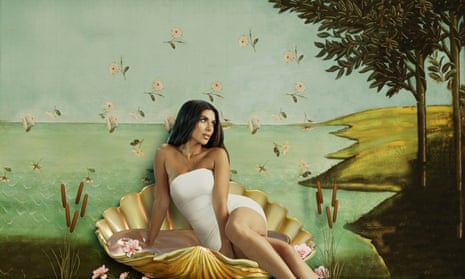During the audition process for Love Island, the producers ask potential contestants to draw their ideal partner. Ekin-Su Cülcüloğlu, who won the latest season, along with her boyfriend Davide Sanclimenti, tells me what she drew. “I didn’t draw someone with a six-pack,” she says. “I just drew a stick man. I put stuff which was not based on the looks – which is really weird because I’ve ended up with someone who cares about his appearance. I put: cultured, family-oriented, loyal, confident, not cocky. Someone who works out and prioritises that; someone strong, my age.” (She’s 28, as is Sanclimenti.) “The producers said: ‘That’s really mature, because most people come in here saying, “I want a man who’s 5ft 10, big willy, someone who can carry me, tall, dark and handsome.” Really basic.’”
We are sitting in her PR firm’s office in Covent Garden, London, and she looks ready for anything – a club, the gym, a red carpet maybe – except perhaps a normal Wednesday morning. It’s not that she’s especially made up or even dressed up: bra top, leggings, cardigan. Rather, it’s the peculiar Love Island cocktail of perfection and enhancement; innate gorgeousness plumped with fillers so that all its stars, Cülcüloğlu in particular, look like humans who have been put through a filter, the Instagram version of real life. On screen, she’s very bombshell: big hair, big lips, pneumatic. In real life, she looks wider-eyed, more Disney princess.
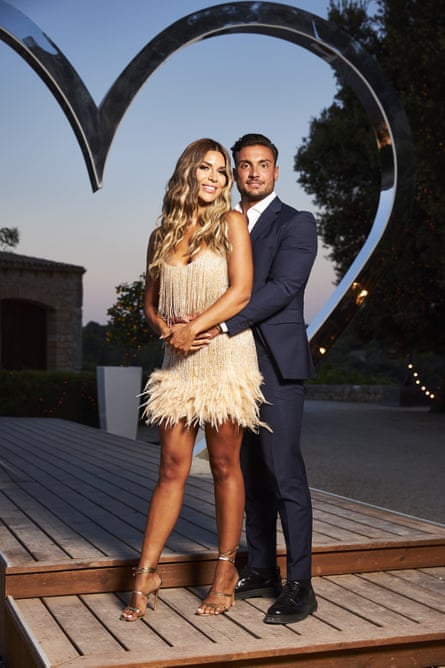
Born in London to Turkish parents, Cülcüloğlu was living in Istanbul, dividing her time between there and Essex, working as an actor, and hoping to star in a film about the Ottoman empire, when the call of destiny came. Whether you’ve seen it or not, you presumably know the principle of Love Island, but for those at the back, 10 improbably good-looking people in their 20s, five men, five women, are taken to a villa to share five double beds in a constantly surveilled dormitory. New people arrive throughout the series, to drive a wedge between existing couples, or pair off with another new arrival – Cülcüloğlu entered as one of these “bombshells” on day three. You cannot be single for long on Love Island, which is possibly its most brutal and atavistic aspect: without the warmth of a mate, you will perish. During the day, they do challenges, which often seem contrived unless the contestants really bring their A-game, and sometimes they go on dates. This year, the public got to vote three days before the start on who should be coupled with whom, so they started off in pairs not of their own choosing. It’s like dropping rats into a cage by their tails.
Cülcüloğlu was not only a fan favourite, but became people’s favourite contestant of all time. New York magazine called her “the best reality-TV star the world has ever seen AND a total sweetie pie”, which nails the mood. She has an idiosyncratic sense of humour, sometimes surreal, sometimes bathetic, sometimes so straight-talking you can’t not laugh. She talks a good game about being a hard arse (indeed, her opening self‑introduction featured the immortal line: “I’m not here to make seasonal girlfriends”), and then completely capsizes all that with her warmth. What looks at first like arrogance is actually a very post-pandemic brand of empowerment, and her self-love is endearing and fun to watch, like a labrador with a ball machine on TikTok. The drama she creates is knowing rather than histrionic.
Love Island completed its eighth season this summer, and Cülcüloğlu is widely credited for the fact that the show, in defiance of reality TV convention, is somehow getting better not worse. She has walked out of the villa with a spin-off travel show for ITV2, visiting Italy and Turkey with Sanclimenti; the realistic prospect of a career in TV; a million-pound ambassador deal with the fashion label Oh Polly (thought to be the biggest deal of any Love Island contestant); and 3.2 million followers on Instagram. “I had 350 on Instagram already,” she says. “I went in there knowing that I didn’t need it, I could leave in the first week or the second week. I had the mentality of, if it doesn’t work or I’m booted off, fine.” She looks at me beadily, as if to appraise whether or not I’m young enough to know what “350” means and decides, on balance, probably not – “350,000”, she clarifies. When I meet her, she’s at the peak of her post-Island fame: she hasn’t had one day off since leaving the villa in August, has been to New York, LA. She is heading back to Italy the day after we meet, and a week later announces she is to appear on the next Dancing on Ice.
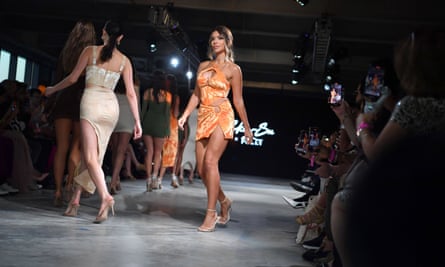
Oh, and let’s not forget that she found love, which is what she was looking for. There’s a question mark over the romantic sincerity of any Love Island couple, given that there’s a cash reward for whoever falls in love the best, and the relationships aren’t always the most durable, although, caveat, there are now as many Love Island babies – as in, children born to pairs of former contestants – as there have been seasons.
But fans and critics immediately remarked that Cülcüloğlu really seemed to mean it – that there was nothing confected about her feelings for Sanclimenti, and no underlying, cynical self, just in it for the screen time. Better still, they were constantly fighting, falling in love, falling out of love, falling back in again, in a way that appeared to be romcom real, because (apparently) it was. “Sometimes, Davide would say, ‘I don’t want to do this show any more, I don’t want to see Ekin.’ And I would say the same. You know: ‘I can’t stand this guy.’ We have pride, I’m not walking to him first, he’s not walking to me first.”
She famously got off with someone else, Jay, and then lied about it, prompting a mad soliloquy from Sanclimenti which ended in an analogy between Cülcüloğlu and a knock-off handbag. She is never more magnificent than in combat, and she knows it. “People said: ‘You spoke out about how you felt when things were going wrong, and most of the girls in there couldn’t.’” Most of the boys in there couldn’t, either. Anyway, she has no regrets. “Davide was very hard work at first. He was very closed. We would try and get to know each other, I’d get one-word answers. I thought, ‘What’s going on? This is Love Island. I’m gonna have to try someone else.’”
So sure, she’s a romantic, but quite a pragmatic one. “I was just thinking, ‘You know what? I’ve had shit luck with boys. I’ll try Tinder, Bumble and Love Island.’” This makes me laugh; the scale is all out of whack, it’s like saying: “You know what? I need a lift, I’ll try Uber, Bolt and Lewis Hamilton.” Love Island is, of course, a dating option only for the beauty elite, but Cülcüloğlu never acknowledges her considerable beauty, and is very insistent on this point. A lot of stories start: “The director saw me sitting on my own, I caught his attention somehow, I don’t know why”; or, “A music producer filmed me on his phone, and said: ‘Who’s this girl?’ It made no sense.” When she was doing a drama degree at the University of Central Lancashire, one of the tutors told her she was very funny, without knowing it, as if it were an accident. I don’t think it’s at all accidental.
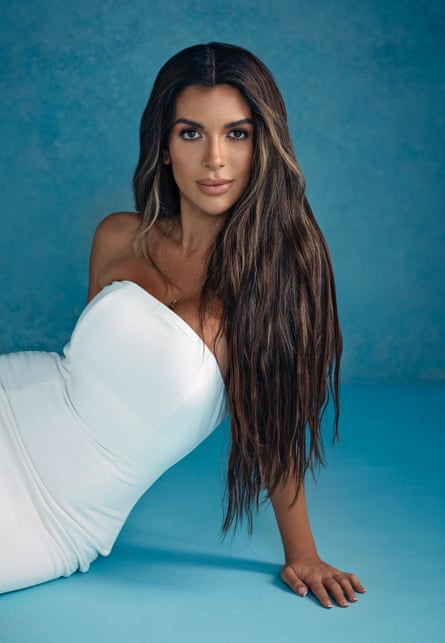
The insistent question of the enterprise, certainly to the middle-aged viewer, especially in the case of someone who already has a career, is this: why would you go on Love Island in the first place? Who would ever submit their entire private self to the public domain like this? It’s not even, in essence, a question about sex, although the spectacle of people stripped to their pants, sharing a bed with a stranger and 360-degree camera coverage, certainly has voyeuristic charge, even for the contestants themselves, who are constantly monitoring one another’s antics. It’s a question about the self: if every emotion, at its most fragile incipience, is immediately visible to the whole world, who could withstand that? And what’s left of you afterwards?
Digital natives don’t find this anything like as confusing as their elders. You could argue that their line between public and private has already been so corroded by the realities of their online existence that the distinction no longer troubles them. Or you could argue that their lifelong immersion in social media has made them much more sophisticated in their self-fashioning, so they know instinctively what’s real and what’s for Instagram. It’s also useful to take a longer view, since it’s not historically unprecedented, this constant performance of the intimate: in their declarations, their violent emotions, their sudden changes of heart, the contestants are a lot like Renaissance courtiers, except none of it rhymes.
Cülcüloğlu’s motivation, as she characterises it, was almost anthropological. “If Love Island wasn’t a show, I would be on there regardless, because of the experiment itself,” she says. “You don’t understand – when you’re in there, you are isolated 10 days before, you don’t have your phone. They’re training you to forget the outside world. When you meet someone, there’s nothing around you to distract you. You have no idea of the time, you don’t know the date. You’re just with your emotions.”
The experience of meeting Cülcüloğlu is a lot like that of being on Love Island with her: on screen, we saw her immediately get everyone’s backs up – well, those of the other women – just by being so confident. She is completely unabashed about her qualities, describing a childhood that was one triumph after another: “My mum and dad knew there was something special in me, knew there was a performance side”; “I got a distinction in all my exams, I could have been a ballerina. My ballet teacher used to say to me: ‘You’ve got very good feet for ballet’”; “When we did school plays, the teacher would always know I was the girl who could sing, act, dance – I’d get the main role. Like if there was a Romeo and Juliet, I’d be Juliet”; “My music teacher used to say that I’ve got good music ears.” But then gradually you start to fall for her – it’s some combination of life force and generosity. She goes to a lot of trouble to make you laugh, and once you’ve surrendered to that, you no longer mind hearing about her great ears, feet, performances and GCSEs.
She whizzes through her childhood, achievement by achievement, sailing through school and a performing arts sixth form, doing brilliantly at university, signing up to an agent in Manchester and getting little adverts, but nothing major. She came to London in her early 20s to get an entry-level job in finance. “I’d split up with my boyfriend, actually one of my true loves. He cheated on me. I was in a very strange state, I felt lost. My parents were divorcing at the time. I didn’t know what to do. My family aren’t wealthy. We’re just normal people, average class. I had to make money, I couldn’t leave uni and do what everyone else does, go travelling, partying.”
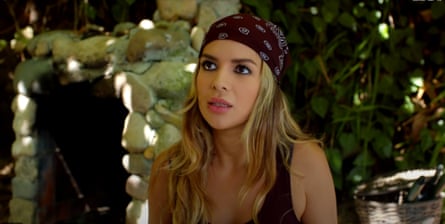
In 2020, unhappy in office life, she moved to Istanbul; she was talent-spotted in the audience of a theatre, and was building a career on stage and screen in Turkey, appearing in the soap opera Kuzey Yıldızı İlk Aşk (North Star First Love), when the pandemic hit. “I was stuck in my flat for a year in Istanbul, couldn’t leave. No family, no friends. It was very strict out there – if you left your flat you would get a fine. Everything was closed.” It’s the kind of Covid experience that could break a lot of people, but Cülcüloğlu says, “I saw a lot of my friends on Zoom, and everyone was getting absolutely pissed. And I thought: ‘They’re losing their mental health.’”
That’s really not where I was expecting the story to go, but anyway. “So I took the opportunity to read books about self growth, psychology, the human brain. Why we feel sad, why we overthink. I really got into it, like it was my job. I started to do gym at home. I ordered these dumbbells, a treadmill. I was doing workouts, talking to myself in the mirror. I became my own friend. That’s when I realised I don’t need anyone. It’s really weird. I didn’t go crazy, I promise, I was just very independent.”
Self-reliance is a trait probably common to a lot of Love Island contestants. You could not submit to the endless judgment of others if you didn’t have steel at your core. But it can go either way: Molly-Mae Hague, a 2019 runner-up along with boxer Tommy Fury, quickly became a symbol of “girlboss” culture, with a reputation for empire building. Hague got a lot of flak for saying that everyone has the same 24 hours in a day, the implication being that people who didn’t hit gold weren’t digging hard enough. “If you’re homeless, just buy a home,” was how one detractor summarised it.
after newsletter promotion
But that’s not Cülcüloğlu’s variant. She sees her resilience more as a quality built through 2020’s adversity. “You face your emotions when everything stops. You can go one way or another way. You could just give up and be an alcoholic and let yourself go and just blame the world for everything. Or you could think, ‘This is going to be over soon. The world’s not going to stop. People need their jobs. We’re going to get back to normality. I’m going to make the most of this moment.’”
She is, in other words, a toughie, which surely everyone in this mad petri dish of a show has to be. One of the strangest things about Love Island is the sight of them all wearing their microphones, whatever else they’re wearing. They may be in a bikini, indeed they’re always in a bikini, and there will still be this contraption strapped to their waists. It’s like a metaphor for how completely they’ve absorbed the artifice of the situation, that the surveillance is part of the body, needn’t even be hidden under clothes. But that isn’t the half of it. “We wake up, we go to bed, we don’t know what time, it could be 4am, 5am. The lights go off. We have our mics on 24 hours. If you take the mic off, there’s a mic on the bed. There’s a mic everywhere. There’s cameras everywhere. You cannot fake it in there. After two days, your mask falls off. People hear you all the time.” It sounds terrifying, dystopian, an exercise in how to break people. And contestants do walk off, though maybe not as often as you would expect (two people left voluntarily this season, including one in the first few days).
The show now prides itself on its pastoral care, but that’s the product of a complex and tragic past: two contestants, one presenter – Caroline Flack – and the boyfriend of one contestant have died by suicide since the current incarnation of the show launched in 2015. You can’t draw straight lines on causality, but whatever producers can do to stabilise such a febrile scenario of their own making, Love Island’s producers now do. “You are looked after like a baby,” Cülcüloğlu says. “If I cut my finger, a medical team would be there in two minutes. With a plaster and a paracetamol. It’s ridiculous. I think it’s extreme care. Every day, you’d have a Zoom call for an hour with a psych, you explain how you feel, how your day is, any problems. It’s all confidential, you take your mic off.”
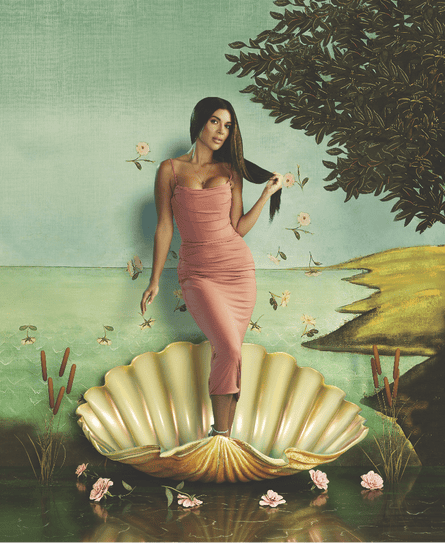
One time, early on, the other girls just came out and told her they didn’t like her (this shades into managed reality, since surely nobody ever does this in real life?). “I went into the Zoom and burst into tears. I didn’t understand. I was just being myself. And the counsellor said: ‘Ekin, you’re being very strong. Sometimes that can intimidate people.’”
Sometimes the situations on Love Island are so conveniently symmetrical or fairytale – betrayals, denouements, rivalries, passion, played out at the most apposite time – that they feel almost scripted, but she insists nothing is. They’re structured only in so far as contestants have these challenges, like party games for toddlers, except with snogging. Other than those and the dates, “The only time the producer would say something is if you’re sitting on a beanbag doing absolutely fuck all. It’s a show. No one wants to watch someone on a bean bag.”
Cülcüloğlu seemed to be doing a lot of the heavy lifting in terms of “bringing the drama”, which is what she promised to do from the start, “because I bring drama naturally in life. Whenever I’m out with friends, something happens, and I’m always involved or I cause it.” One moment in particular stood out, where she competed with a Brazilian woman, Nathalia Campos, to make the best pancakes. It was such an anodyne thing, it could have looked like crap Bake Off, except they were so completely horrible to each other, it was electrifying – and Cülcüloğlu, I have to say, started it. The producers must have really appreciated that, I suggest. “No,” she says, “I’m going to change what you’ve just said.” Bold. “They wanted us to be nice, right? There are scenes in that that aren’t shown. I was swearing. I chased her around with a wooden spoon. Actually a spatula. That was real. I was very angry, but it wasn’t shown because it’s a PG show. I’ve got a really fiery side when people annoy me.” It’s the reverse of what I expected: I’d figured they’d edited out all the bits where she was calm.
It’s not a controversy so much as a talking point, but another sense in which Love Island is considered a problematic social influence is for the unattainable beauty standard it sets, and how unashamedly fake it all is, establishing a norm in which anyone who doesn’t look one Barbie way is just not spending or trying hard enough. Has the taboo around having cosmetic work completely vanished, for this generation? “People now realise you can’t lie,” she says. “Nobody’s stupid, it just makes you look fake if you say, ‘I haven’t had anything done,’ when you clearly have.” Even though it’s normalised, when Cülcüloğlu watched the show back, she decided she would “strip down”, she says: “get rid of the blond highlights, go back to my natural colour – I’m getting it dyed this afternoon. Whatever lip filler I have, I’m going to dissolve. I didn’t like the fake look. I think natural beauty is a lot prettier. I’ve not had anything major done to myself, right? OK, apart from the boobs.”
At what point with Love Island does reality TV become merely porn with incompetent camera angles? Whether or not you think porn is bad in and of itself, you’d probably agree that people should enter into it willingly and openly, and not be led down a complicated path via a series of semi-clad challenges.
But here’s the thing: “No one had sex this year,” Cülcüloğlu says. Seriously? “I’ll tell you why. It’s a new villa. There is this much space [she indicates about 10 inches] between the beds. Who was going to have sex when there’s cameras everywhere? People were doing things towards the end, like blow drying. That was real” – she has defaulted to the “code” contestants used during the show to describe sexual acts – “but no one actually had their salon open. Even when I left the villa with Davide, we couldn’t really relax. The time wasn’t right.” So, wait, they got into this entire relationship, which is now also a TV double-act, inked the contract on the travel show, declared love in an amphitheatre in front of two troubadours, and had more fights than some people have had in a 20-year marriage, before they’d even shagged? “Yeah,” she says, looking at me as if to say, “What of it?”
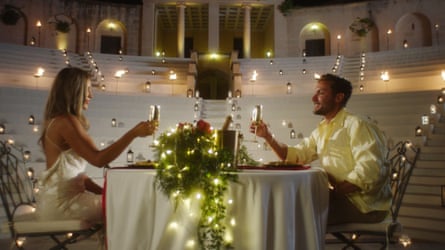
If you can’t judge Love Island by the success of its couples as they leave the show (which you really can’t; people in their 20s split up the whole time), it is still reasonable to ask, what are those relationships like, forged in this bizarre way? She seems to really like Sanclimenti, at least: “If you look at him, you think, ‘Oh, what a handsome guy he is.’ But deep down he’s got such a soft love. He’s got a very pure heart.”
She is not being schmaltzy. She tells it to me straight: “A relationship is about prioritising each other, not being wrapped around a man: being your own independent woman, being able to say, ‘I don’t need you. I want you to add happiness to my life. If you’re not, then goodbye.’”
When the winning couple left the villa, they stayed briefly at a hotel before they went home. What was that first night like? “Davide went, ‘Is there a camera here? Are they filming us now?’ We looked around the room for cameras. We were so paranoid. We were so used to the things, you think they’re everywhere.” They went straight into filming the travel show. “I didn’t realise how real reality was,” Cülcüloğlu says. “Every minute, they’re filming us. We’re a real couple, every married couple argues. You don’t have privacy. They were with us every day.” I initially wondered what the relationship would feel like, without cameras on it, but maybe the better question is, will there ever be a relationship that doesn’t have cameras on it?
